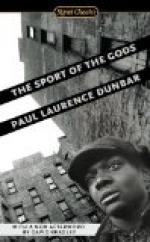It was into this set that Sadness had sarcastically invited Joe, and Joe felt honoured. He found that all of his former feelings had been silly and quite out of place; that all he had learned in his earlier years was false. It was very plain to him now that to want a good reputation was the sign of unpardonable immaturity, and that dishonour was the only real thing worth while. It made him feel better.
He was just rising bravely to swagger out to the theatre when Minty Brown came in with one of the club-men he knew. He bowed and smiled, but she appeared not to notice him at first, and when she did she nudged her companion and laughed.
Suddenly his little courage began to ooze out, and he knew what she must be saying to the fellow at her side, for he looked over at him and grinned. Where now was the philosophy of Sadness? Evidently Minty had not been brought under its educating influences, and thought about the whole matter in the old, ignorant way. He began to think of it too. Somehow old teachings and old traditions have an annoying way of coming back upon us in the critical moments of life, although one has long ago recognised how much truer and better some newer ways of thinking are. But Joe would not allow Minty to shatter his dreams by bringing up these old notions. She must be instructed.
He rose and went over to her table.
“Why, Minty,” he said, offering his hand, “you ain’t mad at me, are you?”
“Go on away f’om hyeah,” she said angrily; “I don’t want none o’ thievin’ Berry Hamilton’s fambly to speak to me.”
“Why, you were all right this evening.”
“Yes, but jest out o’ pity, an’ you was nice ’cause you was afraid I ’d tell on you. Go on now.”
“Go on now,” said Minty’s young man; and he looked menacing.
Joe, what little self-respect he had gone, slunk out of the room and needed several whiskeys in a neighbouring saloon to give him courage to go to the theatre and wait for Hattie, who was playing in vaudeville houses pending the opening of her company.
The closing act was just over when he reached the stage door. He was there but a short time, when Hattie tripped out and took his arm. Her face was bright and smiling, and there was no suggestion of disgust in the dancing eyes she turned up to him. Evidently she had not heard, but the thought gave him no particular pleasure, as it left him in suspense as to how she would act when she should hear.
“Let ’s go somewhere and get some supper,” she said; “I ’m as hungry as I can be. What are you looking so cut up about?”
“Oh, I ain’t feelin’ so very good.”
“I hope you ain’t lettin’ that long-tongued Brown woman bother your head, are you?”
His heart seemed to stand still. She did know, then.
“Do you know all about it?”
“Why, of course I do. You might know she ’d come to me first with her story.”




